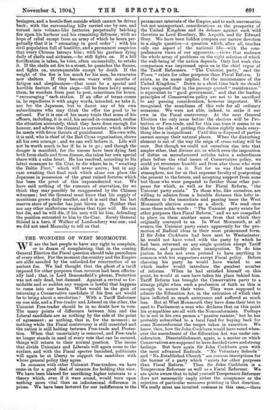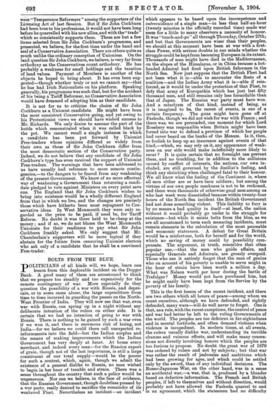• V V or to dream of complaining, that in
the coming General Election the Fiscal question should take precedence of every other. For the moment the country and the Empire are alike assailed by the unlooked-for resurrection of an ancient foe. We had thought that the ghost of a tariff imposed for other purposes than revenue had. been effectu- ally laid ; that, in Lord Beaconsfield's phrase, Protection was not only dead, but damned. Against a revival so for- midable and so sudden any weapon is lawful that happens to come into our hands. What would be the gain of returning a Conservative candidate if his first act would be to bring about a revolution ? With a Tariff Reformer on one side, and a Free-trader and. Liberal on the other, the Unionist Free-trader should be in no doubt how to vote. The many points of difference between him and. the Liberal candidate are as nothing by the side of the point of agreement ; as nothing, that is, for the moment ; as nothing while the Fiscal controversy is still unsettled and the nation is still halting between Free-trade and Protec- tion. When that uncertainty is removed, and Free-trade no longer stands in need of every vote that can be secured, things will return to their normal position. The issues that divide Unionists and Liberals will again come to the surface, and with the Fiscal spectre banished, politicians will again be at liberty to support the candidate with whose general policy they agree.
In common with other Unionist Free-traders, we have come in for a good deal of censure for holding this view. We have been blamed for sacrificing higher interests to a theory which, even if it were sound, would turn upon nothing more vital than an infinitesimal difference in prices. We have been lectured for our indifference to the paramount interests of the Empire, and to such unromantic, but not unimportant, considerations as the prosperity of the United Kingdom and its defence against such wild theorists as Lord Rosebery, Mr. Asquith, and Sir Edward Grey. We have been bidden compare our narrow devotion to a single question—a question which, after all, touches only one aspect of the national life—with the com- prehensive views of our opponents,—views that embrace the whole array of problems on the right solution of which the well-being of the nation depends. Only last week this comparison was impressed upon us in the chief organ of the Tariff Reformers. "The Unionist party," said the Times;" exists for other purposes than Fiscal Reform. It exists, as its name implies, for the maintenance of the United Kingdom." Down to a short time back we should have supposed that in the passage quoted " maintenance " is equivalent to "good government," and that the leading principles of Conservative policy are not to be sacrificed to any passing consideration, however important. We recognised the soundness of this rule for all ordinary occasions. We were not able, indeed, to make it our own in the Fiscal controversy. At the next General Election the only issue before the electors will be Pro- tection or Free-trade, and for this one time it seems to us that by the side of getting this choice rightly made every- thing else is insignificant. Until this is disposed of parties cannot occupy their natural places. When the disturbing element is out of the way the reign of cross-voting will be over. But though we could not ourselves rise into that ampler ether, that diviner air, in which even the imposition of duties on manufactured articles takes a. subordinate place before the vital issues of Conservative policy, we could yet reverence humbly and from afar those who were able to breathe in it. Not for us was that rarefied atmosphere, not for us that supreme faculty of postponing the present to the future, and accepting support from none but those who were prepared to further those other pur- poses for which, as well as for Fiscal Reform, "the Unionist party exists." To those who, like ourselves, are willing to admire from a humble distance this lofty in- difference to the immediate and passing issue the West Monmouth election comes as a shock. We read once more those noble words : "The Unionist party exists for other purposes than Fiscal Reform," and we are compelled to place on them another sense from that which they originally conveyed to us. In West Monmouth, at all events, the Unionist party exists apparently for the pro- motion of Radical ideas in their most pronounced form. If Sir John Cockburn had been sent to Westminster, he would not have voted with the party by which he had been returned on any single question except Tariff Reform, and possibly alien immigration. To do him justice, he does not even pretend to have anything in common with his supporters except Fiscal policy. Before choosing his party he would have waited to see which leader would, introduce the greatest number of reforms. When he had satisfied himself on this point, he would at once have taken his place behind him. Tariff Reform has brought the Conservative party to a strange plight when such a profession of faith as this is enough to secure their votes. They were supposed to admire the Education Act, in the execution of which they have inflicted so much annoyance and suffered so much loss. But at West Monmouth they have done their best to send to Parliament a man who declares that on this point his sympathies are all with the Nonconformists. Perhaps he is not in his own person a "passive resister," but he has probably subscribed to a local fund for buying back for some Nonconformist the teapot taken in execution. We know, then, how Sir John Cockburn would have voted when- ever the amendment of the Education Act was under con- sideration. Disestablishment, again, is a matter on which Conservatives are supposed to have decided views and strong feelings. But here again Sir John Cockburn goes with the most advanced Radicals. "No Voluntary Schools" and "No Established Church" are curious inscriptions for the banner of a party which "exists for other purposes than Fiscal Reform." Then Sir John Cockburn is a Temperance Reformer as well as a Fiscal Reformer. We are quite aware that to label yourself Temperance Reformer does not necessarily imply either the acceptance or the rejection of particular measures pointing in that direction. We really must use inverted commas in this case,—there were "Temperance Reformers" among the supporters of the Licensing Act of last Session. But if Sir John Cockburn had been true to his professions, it would not have been long before he quarrelled with his new allies, and with the " trade " which so consistently supports them. These are but a few items selected from Sir John Cockburn's programme, and presented, we believe, for the first time under the hand and seal of a Conservative Association. There are others quite as much unlike the ordinary conception of Unionism. On the land question Sir John Cockburn, we believe, is very far from orthodoxy as the Conservatives count orthodoxy. He has probably a weakness for small holdings and the taxation of land values. Payment of Members is another of the objects he hoped to bring about. It has even been sug- gested—though whether truly or not we cannot say—that be has had Irish Nationalists on his platform. Speaking generally, his programme was such that, but for the accident of his being a Tariff Reformer, no Conservative Association would have dreamed of adopting him as their candidate.
It is not for us to criticise the choice of Sir John Cockburn as a Unionist candidate. He might have been the most consistent Conservative going, and yet owing to his Protectionist views we should have wished success to Mr. Richards. We only desire to assume the part of the kettle which remonstrated when it was called black by the pot. We cannot recall a single instance in which a candidate has been put forward by Unionist Free-traders whose opinions differed so widely from their own as those of Sir John Cockburn differ from the most democratic section of the Conservative party. Indeed, we do not believe that any candidate of Sir John Cockburn's type has even received the support of Unionist Free-traders. The warnings that have been addressed to us have usually had reference to more remote contin- gencies,—to the dangers to be feared from any weakening of the present Government. We know of no more effectual way of weakening a Government than returning a candi- date pledged to vote against Ministers on every point save one. The England that Sir John Cockburn wishes to bring into existence would be a wholly different England from that in which we live, and the changes are precisely those which have hitherto been most repugnant to Con- servative ideas. In West Monmouth they were only re- garded as the price to be paid, if need be, for Tariff Reform. No doubt it was there held to be cheap at the money ; and if so, we do not blame the West Monmouth Unionists for their readiness to pay what Sir John Cockburn frankly asked. We only suggest that Mr. Chamberlain's supporters will be more logical if they abstain for the future from censuring Unionist electors who ask only of a candidate that he shall be a convinced Free-trader.
BOLTS FROM THE BLUE.



























































 Previous page
Previous page